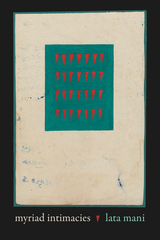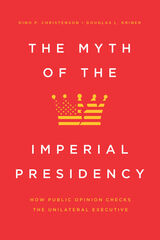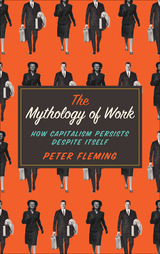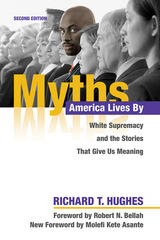2024 books about Political aspects and 106
2024 books about Political aspects
106 start with M start with M
106 start with M start with M

Myriad Intimacies
Lata Mani
Duke University Press, 2022
In Myriad Intimacies postcolonial theorist, spiritual practitioner, and filmmaker Lata Mani oscillates between text and video, poetry and prose, genre and form, register and voice, and secular and sacred to offer a transmedia exploration of the interrelatedness of lives, concepts, frameworks, and aspects of self. She draws on concepts from tantra—a philosophy that celebrates matter as alive, embodiment as sacred, and the senses as a form of intelligence—alongside feminist, critical race, and cultural theory to meditate on the ways in which everyone and everything exists in mutually constitutive interrelations. Addressing issues ranging from desire, the body, nature, and love, to otherness, identity politics, social justice, #MeToo, and the COVID-19 pandemic, Mani foregrounds the power and necessity of recognizing relationality as foundational. Throughout, she offers a way of reframing what we think we know and how we come to know it, demonstrating that it is only by acknowledging and embracing the indivisible and interdependent nature of existence that we restore our true intimacy with each other and the world.
[more]

The Myth of Political Correctness
The Conservative Attack on Higher Education
John K. Wilson
Duke University Press, 1995
The classics of Western culture are out, not being taught, replaced by second-rate and Third World texts. White males are a victimized minority on campuses across the country, thanks to affirmative action. Speech codes have silenced anyone who won’t toe the liberal line. Feminists, wielding their brand of sexual correctness, have taken over. These are among the prevalent myths about higher education that John K. Wilson explodes.
The phrase "political correctness" is on everyone’s lips, on radio and television, and in newspapers and magazines. The phenomenon itself, however, has been deceptively described. Wilson steps into the nation’s favorite cultural fray to reveal that many of the most widely publicized anecdotes about PC are in fact more myth than reality. Based on his own experience as a student and in-depth research, he shows what’s really going on beneath the hysteria and alarmism about political correctness and finds that the most disturbing examples of thought policing on campus have come from the right. The image of the college campus as a gulag of left-wing totalitarianism is false, argues Wilson, created largely through the exaggeration of deceptive stories by conservatives who hypocritically seek to silence their political opponents.
Many of today’s most controversial topics are here: multiculturalism, reverse discrimination, speech codes, date rape, and sexual harassment. So are the well-recognized protagonists in the debate: Dinesh D’Souza, William Bennett, and Lynne Cheney, among others. In lively fashion and in meticulous detail, Wilson compares fact to fiction and lays one myth after another to rest, revealing the double standard that allows "conservative correctness" on college campuses to go unchallenged.
The phrase "political correctness" is on everyone’s lips, on radio and television, and in newspapers and magazines. The phenomenon itself, however, has been deceptively described. Wilson steps into the nation’s favorite cultural fray to reveal that many of the most widely publicized anecdotes about PC are in fact more myth than reality. Based on his own experience as a student and in-depth research, he shows what’s really going on beneath the hysteria and alarmism about political correctness and finds that the most disturbing examples of thought policing on campus have come from the right. The image of the college campus as a gulag of left-wing totalitarianism is false, argues Wilson, created largely through the exaggeration of deceptive stories by conservatives who hypocritically seek to silence their political opponents.
Many of today’s most controversial topics are here: multiculturalism, reverse discrimination, speech codes, date rape, and sexual harassment. So are the well-recognized protagonists in the debate: Dinesh D’Souza, William Bennett, and Lynne Cheney, among others. In lively fashion and in meticulous detail, Wilson compares fact to fiction and lays one myth after another to rest, revealing the double standard that allows "conservative correctness" on college campuses to go unchallenged.
[more]

The Myth of the Imperial Presidency
How Public Opinion Checks the Unilateral Executive
Dino P. Christenson and Douglas L. Kriner
University of Chicago Press, 2020
Throughout American history, presidents have shown a startling power to act independently of Congress and the courts. On their own initiative, presidents have taken the country to war, abolished slavery, shielded undocumented immigrants from deportation, declared a national emergency at the border, and more, leading many to decry the rise of an imperial presidency. But given the steep barriers that usually prevent Congress and the courts from formally checking unilateral power, what stops presidents from going it alone even more aggressively? The answer, Dino P. Christenson and Douglas L. Kriner argue, lies in the power of public opinion.
With robust empirical data and compelling case studies, the authors reveal the extent to which domestic public opinion limits executive might. Presidents are emboldened to pursue their own agendas when they enjoy strong public support, and constrained when they don’t, since unilateral action risks inciting political pushback, jeopardizing future initiatives, and further eroding their political capital. Although few Americans instinctively recoil against unilateralism, Congress and the courts can sway the public’s view via their criticism of unilateral policies. Thus, other branches can still check the executive branch through political means. As long as presidents are concerned with public opinion, Christenson and Kriner contend that fears of an imperial presidency are overblown.
With robust empirical data and compelling case studies, the authors reveal the extent to which domestic public opinion limits executive might. Presidents are emboldened to pursue their own agendas when they enjoy strong public support, and constrained when they don’t, since unilateral action risks inciting political pushback, jeopardizing future initiatives, and further eroding their political capital. Although few Americans instinctively recoil against unilateralism, Congress and the courts can sway the public’s view via their criticism of unilateral policies. Thus, other branches can still check the executive branch through political means. As long as presidents are concerned with public opinion, Christenson and Kriner contend that fears of an imperial presidency are overblown.
[more]

Mythical River
Chasing the Mirage of New Water in the American Southwest
Melissa L. Sevigny
University of Iowa Press, 2016
In a lyrical mix of natural science, history, and memoir, Melissa L. Sevigny ponders what it means to make a home in the American Southwest at a time when its most essential resource, water, is overexploited and undervalued. Mythical River takes the reader on a historical sojourn into the story of the Buenaventura, an imaginary river that led eighteenth- and nineteenth-century explorers, fur trappers, and emigrants astray for seventy-five years. This mythical river becomes a metaphor for our modern-day attempts to supply water to a growing population in the Colorado River Basin. Readers encounter a landscape literally remapped by the search for “new” water, where rivers flow uphill, dams and deep wells reshape geography, trees become intolerable competitors for water, and new technologies tap into clouds and oceans.
In contrast to this fantasy of abundance, Sevigny explores acts of restoration. From a dismantled dam in Arizona to an accidental wetland in Mexico, she examines how ecologists, engineers, politicians, and citizens have attempted to secure water for desert ecosystems. In a place scarred by conflict, she shows how recognizing the rights of rivers is a path toward water security. Ultimately, Sevigny writes a new map for the future of the American Southwest, a vision of a society that accepts the desert’s limits in exchange for an intimate relationship with the natural world.
In contrast to this fantasy of abundance, Sevigny explores acts of restoration. From a dismantled dam in Arizona to an accidental wetland in Mexico, she examines how ecologists, engineers, politicians, and citizens have attempted to secure water for desert ecosystems. In a place scarred by conflict, she shows how recognizing the rights of rivers is a path toward water security. Ultimately, Sevigny writes a new map for the future of the American Southwest, a vision of a society that accepts the desert’s limits in exchange for an intimate relationship with the natural world.
[more]

The Mythology of Work
How Capitalism Persists Despite Itself
Peter Fleming
Pluto Press, 2015
Once, work was inextricably linked to survival and self-preservation: the farmer ploughed his land so that his family could eat. In contrast, today work has slowly morphed into a painful and meaningless ritual for many, colonizing almost every part of our day, endless and inescapable.
In The Mythology of Work, Peter Fleming examines how neoliberal society uses the ritual of work—and the threat of its denial—to maintain the late capitalist class order. Work becomes a universal reference point, devoid of any moral or political worth, transforming our society into a factory that never sleeps. Blending critical theory with recent accounts of job-related suicides, office-induced paranoia, fear of relaxation, managerial sadism, and cynical corporate social responsibility campaigns, Fleming paints a bleak picture of a society in which economic and emotional disasters greatly outweigh any professed benefits.
In The Mythology of Work, Peter Fleming examines how neoliberal society uses the ritual of work—and the threat of its denial—to maintain the late capitalist class order. Work becomes a universal reference point, devoid of any moral or political worth, transforming our society into a factory that never sleeps. Blending critical theory with recent accounts of job-related suicides, office-induced paranoia, fear of relaxation, managerial sadism, and cynical corporate social responsibility campaigns, Fleming paints a bleak picture of a society in which economic and emotional disasters greatly outweigh any professed benefits.
[more]

Myths America Lives By
White Supremacy and the Stories That Give Us Meaning
Richard T. Hughes
University of Illinois Press, 2018
Six myths lie at the heart of the American experience. Taken as aspirational, four of those myths remind us of our noblest ideals, challenging us to realize our nation's promise while galvanizing the sense of hope and unity we need to reach our goals. Misused, these myths allow for illusions of innocence that fly in the face of white supremacy, the primal American myth that stands at the heart of all the others.
[more]
READERS
Browse our collection.
PUBLISHERS
See BiblioVault's publisher services.
STUDENT SERVICES
Files for college accessibility offices.
UChicago Accessibility Resources
home | accessibility | search | about | contact us
BiblioVault ® 2001 - 2024
The University of Chicago Press









